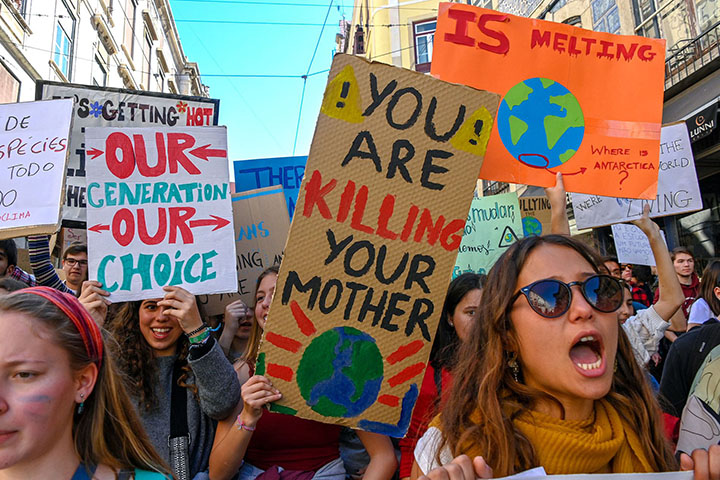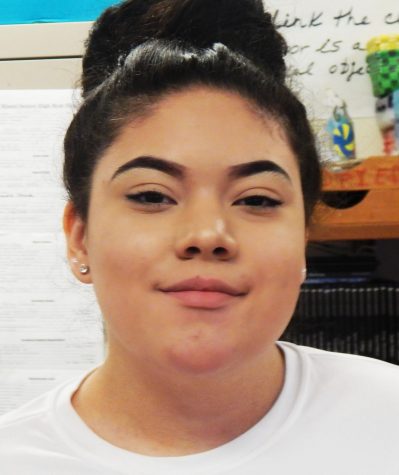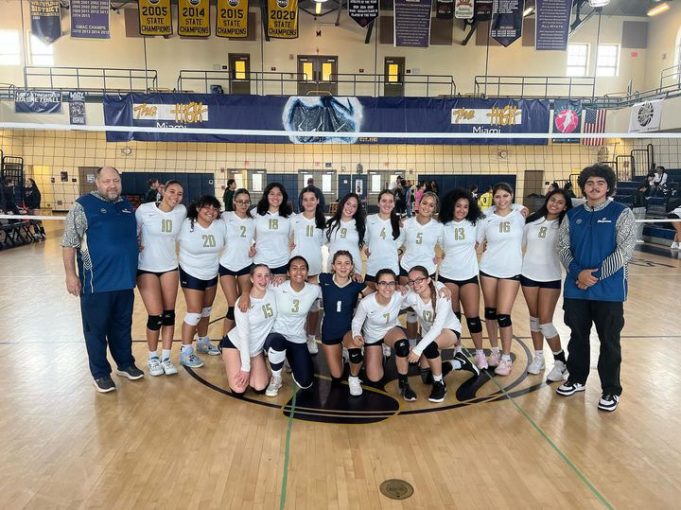Youths Take on Climate Change
On March 15, 2019 students joined a #FridaysForFuture event outside the Houses of Parliament in London, England. This event was started by 17 year old Greta Thunberg, an environmental activist who would skip school to protest on Fridays.
February 26, 2020
Climate change has been an ongoing topic for several decades now, yet the awareness of youth today, is growing more than ever whether in protests or volunteering through organizations.
Is Climate change real?
Climate change causes a lot of controversy. Sophomore Michelle Martos believes climate change is real because of the science proving it. “Anyone who is denying the existence of climate change is simply denying the science,” she said.
Senior Nathaly Sevilla added, “Sudden bush fires in Australia that have lasted 3 months isn’t normal. Each year being the hottest year recorded isn’t a coincidence. It’s a problem.”
On the other hand, junior Moises Garcia doesn’t believe in climate change because he doesn’t see the effects. “This supposed issue has been going on since I can remember, yet nothing happens,” he said.
The awareness
Many students, however, have seen its effects firsthand. Senior Jesse Orteja has seen the rising floods and increase in temperature. “The increase in hurricanes is the result of the ocean’s cry for help, especially when places such as Miami Beach are so flooded when a storm hits,” she said.
Michelle Martos said, “I see how hot Miami is becoming. Although Miami is known to be the Sunshine State, I remember many winters ago, Miami would get a lot colder and stay like that for a longer period of time. Yet, now it can be cold one morning and then switch to 80 degrees by the time it’s 12 pm.” She added, “It’s not normal when you see glaciers melting which results in our sea level rising and then turns into the extinction of animals and soon humans.”
Nathaly Sevilla said, “It’s less-developed nations and minority groups facing the worst of it all. It’s huge wildfires in the Amazon rainforest. It’s droughts in California. It’s floods in Miami. It’s extinction of all living organisms on earth including us,” she said.
Senior Lucy Severo said, “It places stress and worsens conditions in areas that are already affected. We should be giving service to the planet we live on, not taking it for granted.”
A representative of the Youth-led organization, Youth 4 Nature who currently resides in Kenya, Africa, Paul Mutuku has also seen how climate change affects where he lives. “For us in Kenya, Africa, it is actually not a distant prospect, rather, a daily reality we have to constantly face. Just recently, Kenya suffered extreme floods during the December rains, and now the rains are persisting into January- a rather dry month normally. Just last year, hurricanes swept over many families in Southern Africa, resulting in huge losses to lives, livelihoods and infrastructure. Temperatures are increasing, the polar ice caps are melting, sea level rise is threatening small island nations like Fiji, Kiribati, who are already making places to relocate their displaced citizens to other countries. Extreme droughts and famines, are getting exacerbated across the sub-Saharan Africa,” he said.
He also mentioned that there are certain crops they cannot grow in Kenya. Because of how weather patterns have changed and now, farmers cannot predict seasons well, which has impacted the food basket in the country.
3 Facts about Climate Change
- Eleven percent of all global greenhouse gas emissions caused by humans are caused by deforestation — comparable to the emissions from all of the cars and trucks on the planet.
- An area of coastal ecosystems larger than New York City is destroyed every year, removing an important buffer from extreme weather for coastal communities and releasing carbon dioxide into the atmosphere.
- NASA and NOAA data show that global averages in 2016 were 1.78 degrees F (0.99 degrees C) warmer than the mid-20th century average. Seventeen of the 18 warmest years have occurred since 2000.
Source: www.conservation.org
Defining Climate Change
Climate change refers to changes in long-term climate patterns. Some people, such as Helen McGregor, Australian Research Council Future Fellow, of University of Wollongong, and other contributers are experts on this issue of climate change. In an article titled, “The Industrial Revolution Kick-started global warming much earlier than we realized” which they published on the website The Conversation, a website for Authors to write on a subject on which they have proven expertise <www.theconversation.com>. Climate change has been an issue that has been around ever since the Industrial Revolution and the start of burning fossil fuels. “According to our evidence, in all regions except for Antarctica, we are now truly operating in a greenhouse-influenced world. We know this because the only climate models that can reproduce the results seen in our records of past climate are those models that factor in the effect of the carbon dioxide released into the atmosphere by humans,” Helen McGregor said.
Climate change is caused by a combination of factors, yet it is correlated mostly with human activity.
What are you doing to take action?
Changing a daily habit of living can be difficult yet some students can manage to make a change in their daily routine. Senior Andrea Crespo said she has stopped using plastic items such as bags, water bottles, and utensils. “I also walk whereever I can easily walk to. Driving to school is pointless to me considering I live only a few blocks away from school, and if I have the chance to walk anywhere, I will always prefer walking instead,” she said.
Junior Jose Torrentes, on the other hand, believes taking any sort of action against climate change is pointless due to his lack of interest on it. “I’m oblivious to what is going on and I don’t want to seem like a hypocrite if I were to partake in any action. After all, how can I possibly change anything?” he asked.
Ways We Can Help
A representative of the youth-led Environmental Defense Fund in Florida, Emily Johnson. Provided things the future generations, the youth can do to help address climate Change.
She said we can join climate activists in protests and climate strikes, speak to representatives about climate change, vote in elections for environmentally conscious leaders and make changes to our own lifestyle to reduce waste. “I shop second hand, reuse and recycle items, and personally do not drive to offset my carbon footprint,” she said.
Senior Sandy Rubi said, “We can stop supporting companies that don’t insist on eco-friendly action via how they produce. We are in control of what is bought. For example, so many food chains such as Burger King have now added an alternative to meat on their menus because consumers aren’t purchasing as much meat anymore.”
Similarly, to Economics teacher Mr. Rodriguez said although many of us don’t have money to purchase eco-friendly products, we can switch our eating habits such as turning to Vegetarianism.
What does our future look like?
Students give a picture to what the future will look like if we don’t do anything about it now. Senior Sharon Lanza said, “The issue will become so irreversible, there will be nothing as an option to save the planet. The world will die, and we as well will die along with it.”
Computer science teacher, Mr. Jara said, “There are maps showing how Antartica, for example, has gotten “smaller”. The ice that would cover the continent, is melting away. At some point, we won’t have the continent, and slowly everything else.”
Senior Tomy Castillo said, “Future generations will die young. They won’t get to live life as long as my grandparents or even us because the oxygen the world once had will no longer exist,” he said.
On the other side of the line, Senior Alex Ferrer believes Climate change won’t affect us in the future. “Climate Change is a natural phenomenon and it will continue to happen long after us humans are gone.”






